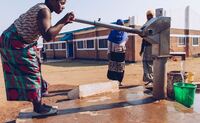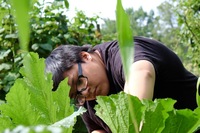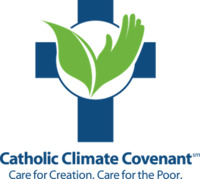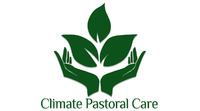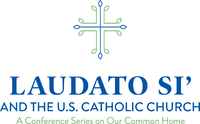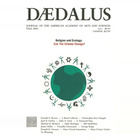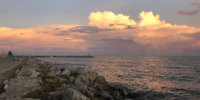Search
288 items
-
Religious Americans Demand Climate Action
This article offers a unique perspective on the intersection of environmentalism, religion, and politics. On the one hand, the current established consensus of virtually all religious groups is that climate change is real and human-induced, with certain religious groups placing extra pressure on politicians to advance climate legislation quickly. On the other hand, politicians have interacted with important religious leaders to rouse motivation among congregations to mitigate the effects of climate change. The article also includes actions being taken by religious groups toward fighting climate change on both national and local platforms. -
Evangelical Group Releases Climate Change Report, Urges a Biblical Mandate for Action
The article discusses a new report called “Loving the Least of These: Addressing a Changing Environment” by the National Association of Evangelicals that cites a “biblical basis” for stopping climate change. The report was written to spur fellow evangelicals to rally together and address the issue. It cites the Bible, with verses about caring for creation and each other, as well as basic climate science about air pollution as its reasoning. An interview about evangelicals’ current views on the issue with Dorothy Boorse, one of the authors of the report, is included. -
The Language of Science and Faith: Straight Answers to Genuine Questions
This book discusses the links between science and faith and attempts to reconcile the two communities by demonstrating ways in which Christians can find God in scientific theories. Written by Francis Collins, a leader in the Human Genome Project, and scientist Karl Giberson, it offers a holistic view of the intersection between science and religion. -
American Jewish World Service- Land, Water, and Climate Justice: Story Collection
The American Jewish World Service compiled a website of their outreach stories from the US, Africa, Asia, Latin America, and the Caribbean. Reflections from work with Indigenous communities are included as well. The environmental activism showcased on their website also defend women and their crucial involvement with agriculture and the environment. From the website;
"We aid communities and movements organizing to protect the land, water and natural resources that people depend on for their survival".
More information on how to get involved is listed on their website. -
Religions of the World and Ecology
"Enroll in these free self-paced courses from Yale University and Coursera to explore the answers to these questions and experience the rich ecological teachings and dynamic practices of religious traditions across our planet Earth." -
Quench Their Thirst
"Welcome to the Quench Their Thirst Fundraising Project!
Water is a basic necessity of life, yet millions of people around the world lack access to this essential resource. By setting up a fundraising page, you can make a difference and help quench the thirst of those who need it most.
The money you raise will build water wells, boreholes and water filtration plants in rural communities in Africa and Asia, where people currently have no choice but to walk for miles to collect dirty, contaminated water. This not only puts their health at risk, but also takes up valuable time that could be spent on education, work, or caring for family members." -
Dharma Action Network for Climate Engagement (DANCE)
"Dharma Action Network for Climate Engagement (DANCE) is a space for connecting to explore the breadth of possible Dharma responses to climate change and related issues.
As well as an opportunity to network and form more localized groups of support, activity and political action, a wide range of creative ideas and experiments in passionate and compassionate engagement may be shared, incubated, and hatched together through this space.
It can also serve as a more central forum to discuss perspectives and to voice feelings about the environmental crises we face; and as a hub for information on relevant events and resources, including related retreats, workshops, artistic and other enterprises." -
Saving India’s Rivers: Ecology, Civil Society, Religion, and Legal Personhood
"Abstract: In recent decades, India’s environment has been severely compromised by riverine pollution combined with large-scale dams and exacerbated by diversion for irrigation. Most prominent among the rivers so affected has been the Ganges and its tributaries in northern India, which for Hindus include the country’s most sacred bodies of water. This paper examines three campaigns opposing dam construction, arguably the most widely publicized and analyzed efforts of this kind since independence in 1947. One campaign was essentially secular with virtually no religious component, the second mostly secular with some religious support, and the third almost totally a religious initiative. In the end, only the third attained any real success, and that rested on circumstances unlikely to be replicated. The possibility that future campaigns of this scale can be taken up again appears remote. Meanwhile, riverine pollution has continued to increase everywhere despite massive governmental programs to reduce it. Theoretically, it would seem that environmentalists and Hindu devotees with their veneration of nature should be able to work in common cause to reduce pollution, but any large-scale cooperation seems unlikely between these two disparate realms. More recently an effort to protect rivers by endowing them with legal personhood enjoyed an initial success, holding the promise that lawsuits could be brought on behalf of a river against those polluting it. The paper concludes that while the legal personhood strategy is currently stalled, it offers the best chance for eventual success in attenuating riverine pollution. In the course of the paper, a comparative theoretical framework for assessing anti-dam protests will be tested." -
All Education is Environmental Education
"[This is the final article in a series about the connection between Jewish identity, food, and the natural environment, written by grantees and partners of The Covenant Foundation.]
As we too slowly wake up to the human-made climate emergency, it’s critical to consider the role of the Jewish educator. We know that the answer to this crisis is not simply the acquisition of more knowledge. Rather, the question becomes:
How can we teach our students in ways that help them become better equipped to engage with the climate emergency and other environmental crises?" -
Climate Action After High School: A Community Conversation
"Catholic Climate Covenant is hosting a community conversation for recent high school grads looking to be involved in climate action efforts on their college campus and beyond. Hear from current college students and virtually meet other recent high school graduates involved in faith-based climate justice efforts.
Email Kayla Jacobs at kayla@catholicclimatecovenant.org or Diana Marin at diana@catholicclimatecovenant.org with any questions." -
2023 Catholic Youth Climate Summit
"In February 2023 we hosted, in partnership with the Archdiocese of Chicago and youth leaders, a Catholic Youth Climate Summit. Check out this video from the summit and hear why youth care about the climate crisis and how they connect their faith with climate action. Thank you to all of our students leaders for putting together this great event for their fellow students!" -
At Catholic climate conference, Paris Agreement architect challenges US church to commit to net-zero emissions
National Catholic Reporter covered the Catholic Climate Conference for Earthbeat. The architect of the Paris Agreement challenged the US church to commit to net-zero emissions. -
Encounter for our Common Home
"'Encounter for Our Common Home' is a broad U.S. Catholic coalition-led training and advocacy campaign to encounter and urge government and Church leaders to support climate solutions from a place of faith and reason. When you join you will be the first to hear of campaign events including community-building events, trainings, young adult materials and engagement, webinars, resources, action alerts and more!" -
Wholemakers
"We're thrilled to introduce Wholemakers, a groundbreaking resource for young adults focused on creation care and integral ecology. Developed for young adults, by young adults, this resource weaves together the latest climate science with insights from the Catholic tradition to equip young adults to be the faithful protagonists of transformation the world needs." -
Climate Pastoral Care Course
"Faith communities are equipped with their own traditions and tools that can help us face the climate emergency. Learn more about the physical, emotional, mental health, and spiritual impacts of the climate crisis and how to address them through the practice of pastoral care in this new thirteen-module course." -
Laudato Si' and the U.S. Catholic Church: A Conference Series on Our Common Home
“'Laudato Si’ and the U.S. Catholic Church: A Conference Series on Our Common Home' is a biennial series to equip and inspire Catholics to more deeply integrate Laudato Si’ and its climate change teaching into the U.S. Church.
The 2023 convening will be virtual and open on June 14 with a keynote address from Ms. Christiana Figueres, former Executive Secretary of the United Nations Framework Convention on Climate Change (UNFCCC) who brokered the Paris Agreement.
Throughout June and July, the series will host virtual 90-minute sessions on the goals of the Vatican's Laudato Si' Action Platform. Each session will feature a scholar who describes the goal, a practitioner who outlines their work to achieve the goal, and a moderated Q&A.
Catholic Climate Covenant is coordinating the Laudato Si' Action Platform in the U.S. Catholic Church through its God's Plan(et) initiative and Creighton University is a Platform signatory.
The first 'Laudato Si' and the U.S. Catholic Church' convening was held at Creighton in June 2019 and the presentations were published in the Journal of Moral Theology. The second was held virtually in June 2021 and the presentation recordings are available here." -
Its promised land drying, Mormon Church works to save the Great Salt Lake
Due to overuse and climate change, the Great Salt Lake is drying and is estimated to disappear in about five years. In response to this, the Mormon Church of Jesus Christ of Latter Day Saints has started public conservation and water-saving efforts. This article describes these efforts and the role of the Great Salt Lake in the local environment and culture. -
Indigenous Americans: Spirituality and Ecos
A brief article about the indigenous peoples' traditions and characteristics regarding their religions and religious beliefs and the connection to the environment. Author Jack D. Forbes goes over the "indigenous cosmic visions" and their "conception of creation as a living process, resulting in a living universe in which a kinship exists between all things". He goes through different entries and quotes of indigenous figures in the Americas and their thoughts and connection to land and religion. -
Dayenu: A Jewish Call to Climate Action
Dayenu is a Jewish organization that confronts the climate crisis through spiritual and political action. The organization has several "circles" spread around the United States and Canada that meet at least once a month and participate in 2-3 national campaigns a year. Dayenu offers resources to start a local circle or co-affiliate an already existing organization. -
Environmental Stewardship In Columbus Catholic Schools
This article highlights environmental actions being taken by students at a variety of grade levels in Catholic schools in the Diocese of Columbus following the release of Pope Francis’s “Laudato Si’: On Care for Our Common Home,” in 2015. These actions include the creation of a greenhouse and gardens, city cleanup days, energy audits, and natural play areas for younger children. -
Catholics look to mindfulness practices to ground climate action, quell eco-anxiety
Eco-anxiety is a fear revolving around the awareness of the climate crisis and the loss of hope for solving environmental issues. Many Catholics have started practicing the role of mindfulness, which is rooted in Buddhist practices. Mindfulness is the act of being present and keeping oneself grounded. The news article discusses how mindfulness leads to an appreciation for the natural world and will push people to pursue ways to help the environmental crisis. -
Going Green at Camp
This article is written by Colleen Earp, a director at Camp Hanover, which aims to practice Environmental Ministry. Earp writes a bit about her own experiences growing up with camp and how they shaped her interest in environmental conservation. The piece discusses the importance of stewardship and a spiritual connection with creation. It also quotes the executive director Doug Walters, who explains the camp's modeling of environmental practices that are easy for campers to pick up and repeat once they have returned home. -
Seattle University Becomes the First Catholic, Jesuit University to Fully Divest from Fossil Fuels
"As of June 30, 2023, Seattle University (SU) has withdrawn all investments in fossil fuel companies from its endowment portfolio, becoming the first university in Washington state and the first Catholic, Jesuit university in the country to fulfill their commitment to divest from fossil fuels. SU is now charting a new course of socially conscious investing.
SU is a leader in the divestment and sustainability movements globally and nationally. In 2018, SU became the first Jesuit university in the country to pledge 100 percent withdrawal from publicly traded fossil fuel investments. Since then, six other Jesuit universities followed SU’s lead and made some level of commitment to divest, according to the Association of Jesuit Colleges and Universities..." -
Faith in Place Personal Reflection
"I consider the Waukegan Harbor and Beach the gem of my city. Nostalgia rushes back from my favorite memories at the lake. From running on the pier with my cross-country teammates to watching the most beautiful pink sunsets with a cone of ice cream in hand - it is still one of my favorite places to be today.
Growing up, I did not realize the factory on the shore of our beach was a coal plant polluting our air and water. I feared how much this coal plant might have affected me, my family, my friends, and the cherished gem of my community.
My work with Faith in Place is driven by my hope that future generations of Waukegan do not have to wonder and fear how the plant on their beach is affecting their health and environment. The Waukegan Harbor and Beach remains one of my favorite places in the city – but I’m excited to reimagine it without the coal plant on its shore.
Michelle Luu" -
Nature & the Environment
This statement, from the World Zoroastrian Organization, details the environmental perspectives, values, and practices in Zoroastrianism. The web page makes it clear that Zoroastrianism is largely grounded in a heightened environmental consciousness.






